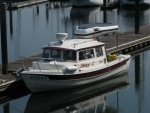forrest":24fuz36o said:
Good job! I hate the salmon farms for an entirely different reason. Sardine seines net all the bait and bottom fish so the fish processing industry can grind the biomass up for protein pellets to feed the farmed fish. The sardine seines have decimated the west coast bait fish populations just as they have done to the menhaden on the east coast.
It takes about 12 lbs of fish when fed to farm salmon to produce ONE pound of farm salmon.
The fish farms take fish that are edible to humans, and bait fish, to make their salmon. Wild salmon eat krill and catch their own bait fish in the mid Pacific oceans to grow. The wild fish feed themselves as they are supposed to, while the farm fish need to be fed valuable protein and drugs to create a low quality product.
Not considered is how arrogant it is to destroy a wild food source for current profit! The wild salmon have been feeding the people of the coast for 10,000 plus years. Should we destroy the wild salmon in just one generation for the profit of a few?

